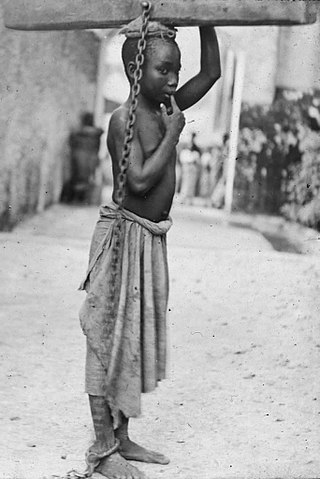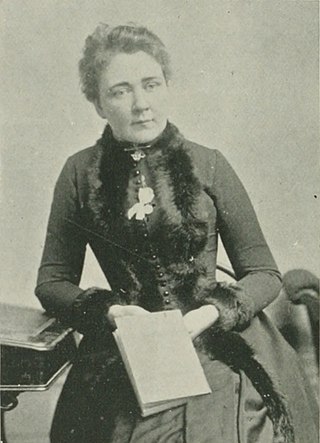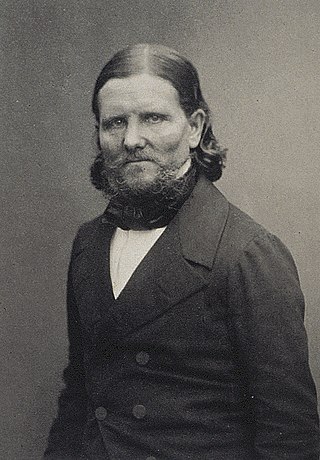Related Research Articles

Abolitionism, or the abolitionist movement, is the movement to end slavery and liberate slaves around the world.

The temperance movement is a social movement promoting temperance or complete abstinence from consumption of alcoholic beverages. Participants in the movement typically criticize alcohol intoxication or promote teetotalism, and its leaders emphasize alcohol's negative effects on people's health, personalities and family lives. Typically the movement promotes alcohol education and it also demands the passage of new laws against the sale of alcohol, either regulations on the availability of alcohol, or the complete prohibition of it.
The Woman's Christian Temperance Union (WCTU) is an international temperance organization. It was among the first organizations of women devoted to social reform with a program that "linked the religious and the secular through concerted and far-reaching reform strategies based on applied Christianity." It plays an influential role in the temperance movement. Originating among women in the United States Prohibition movement, the organization supported the 18th Amendment and was also influential in social reform issues that came to prominence in the progressive era.

Frances Elizabeth Caroline Willard was an American educator, temperance reformer, and women's suffragist. Willard became the national president of Woman's Christian Temperance Union (WCTU) in 1879 and remained president until her death in 1898. Her influence continued in the next decades, as the Eighteenth and Nineteenth Amendments to the United States Constitution were adopted. Willard developed the slogan "Do Everything" for the WCTU and encouraged members to engage in a broad array of social reforms by lobbying, petitioning, preaching, publishing, and education. During her lifetime, Willard succeeded in raising the age of consent in many states as well as passing labor reforms including the eight-hour work day. Her vision also encompassed prison reform, scientific temperance instruction, Christian socialism, and the global expansion of women's rights.

The Prohibition Party is a political party in the United States known for its historic opposition to the sale or consumption of alcoholic beverages and as an integral part of the temperance movement. It is the oldest existing third party in the United States and the third-longest active party.

The Anti-Saloon League, now known the American Council on Addiction and Alcohol Problems, is an organization of the temperance movement in the United States.

The Catholic Total Abstinence Union of America was a Roman Catholic temperance organization active in the 19th and 20th centuries. The work of Father Mathew in promoting temperance across the U.S. led to the establishment of numerous separate and independent Catholic temperance groups. The Catholic temperance societies of Connecticut created a state union in 1871, from which a national union was formed the following year at a convention in Baltimore, Maryland. 177 such societies from 10 states and the District of Columbia, representing a total of 26,481 members, created the Catholic Total Abstinence Union of America. In total, over 500,000 Roman Catholics made the temperance of the Catholic Total Abstinence Union of America.

The White Ribbon Association (WRA), previously known as the British Women's Temperance Association (BWTA), is an organization that seeks to educate the public about alcohol, tobacco, and other drugs, as well as gambling.

Mary Greenleaf Leavitt was an educator and successful orator who became the first round-the-world missionary for the Woman's Christian Temperance Union (WCTU). Setting out on virtually non-stop worldwide tours over a decade, she "went to all continents save Antarctica," where she crusaded against alcohol and its evils including domestic violence; and advocated for women's suffrage and other equal rights such as higher education for women. In 1891 she became the honorary life president of the World's WCTU.
The Woman's Temperance Publishing Association (WTPA) was a non-commercial publisher of temperance literature. Established in 1879 in Indianapolis, Indiana during the national convention of the Woman's Christian Temperance Union (WCTU), it was a concept of Matilda Carse, an Irish-born American businesswoman, social reformer and leader of the temperance movement.

Jessie Ackermann was a social reformer, feminist, journalist, writer and traveller. She was the second round-the-world missionary appointed by the World's Woman's Christian Temperance Union (WWCTU), becoming in 1891 the inaugural president of the federated Australasian Woman's Christian Temperance Union (WCTU), Australia's largest women's reform group. Although an American, Ackermann is considered a major voice in the Australian suffrage movement.

In the United States, the temperance movement, which sought to curb the consumption of alcohol, had a large influence on American politics and American society in the nineteenth and twentieth centuries, culminating in the prohibition of alcohol, through the Eighteenth Amendment to the United States Constitution, from 1920 to 1933. Today, there are organizations that continue to promote the cause of temperance.

Norman Shanks Kerr was a Scottish physician and social reformer who is remembered for his work in the British temperance movement. He originated the Total Abstinence Society and was founder and first president of the Society for the Study and Cure of Inebriety which was founded in 1884.

Jennie Fowler Willing was a Canadian-born American educator, author, preacher, social reformer, and suffragist. She married a lawyer and Methodist pastor at age 19. In 1873, she and her husband became professors at Illinois Wesleyan University. In addition to teaching, she was a leader in the temperance movement. Willing came to notice when she joined the Illinois Woman's State Temperance Union, serving as its leader for some years. She and Emily Huntington Miller were involved with creating and presiding over the First Woman's National Temperance Convention of 1874 in Cleveland where the National Woman's Christian Temperance Union was formed. She served as the editor of the national organization's journal for a period. In 1895, she created the New York Evangelistic Training School. Willing wrote several books including From Fifteen to Twenty-five: A Book for Young Men and serials for newspapers.

Margaret Eleanor Parker (1827–1896) was a British social activist, social reformer, and travel writer who was involved in the temperance movement. She was a founding member of the British Women's Temperance Association (BWTA) in 1876, and served as its first president. Born in England, Parker resided in Scotland. She was a delegate to the 1876 International Organisation of Good Templars (IOGT) meeting which led to the formation of the BWTA. She was also instrumental in founding the World Woman's Christian Temperance Union (WWCTU). In 1881, she founded another type of women's association, one which focused on horticulture and supply, but it did not flourish. Parker described her travels in the Eastern United States in Six Happy Months amongst the Americans (1874).

William Horsell was an English hydrotherapist, publisher, and temperance and vegetarianism activist. Horsell published the first vegan cookbook in 1849.

The Union Signal is a defunct American newspaper. It was the organ of the National Woman's Christian Temperance Union (N.W.C.T.U.), at one time, the largest women's organization in the United States. Established in 1874 aa The Woman's Temperance Union, it was renamed in 1877 as Our Union. When Our Union merged with another temperance paper, The Signal, in 1883, the organ's name was changed to The Union Signal. Published in Chicago, Illinois, it focused on the woman's temperance movement in the U.S. Initially, a weekly 16-page illustrated newspaper, it shifted location and publishing schedule before it ceased publication in 2016. The last edition of the N.W.C.T.U.'s quarterly journal, titled The Union Signal, was published in 2015, the main focus of which was current research and information on drugs.
Non-Partisan National Women's Christian Temperance Union was an American temperance association organized at Cleveland, Ohio, January 22, 1890, as a protest against the attitude of the Woman's Christian Temperance Union (W.C.T.U.) toward political parties.
References
- ↑ www.encyclopedia.com
- ↑ Blocker, Jack S.; Fahey, David M.; Tyrrell, Ian R. (2003). Alcohol and temperance in modern history: an international encyclopedia . ABC-CLIO. p. 400. ISBN 978-1-57607-833-4.